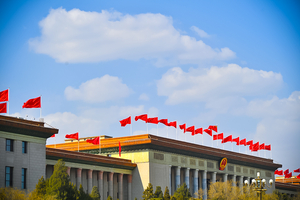In Depth: Punishing People for Their Relatives’ Crimes Comes Under Scrutiny in China
Listen to the full version

Legal experts in China are pushing to reform a longstanding practice that can cause law-abiding citizens to lose their shot at joining the civil service, getting into certain university programs or the military if they happen to be related to a convicted criminal.
The reform push has the potential to curtail the practice — known as collective punishment — that has been criticized for violating basic legal norms and putting a vast share of China’s population at risk of being punished for the actions of another.

Download our app to receive breaking news alerts and read the news on the go.
Get our weekly free Must-Read newsletter.
- DIGEST HUB
- Legal experts in China are advocating for the end of collective punishment, a practice affecting relatives of offenders, which impacts their civil service jobs, education, and military opportunities.
- This practice, though not explicitly part of China's Criminal Law, has extended through local regulations and organizational rules, affecting millions due to the country's familial ties.
- Calls for regulatory changes emphasize the constitutional principles that only offenders should bear criminal liability, urging reforms on restrictions affecting both criminals and their relatives.
Legal experts in China are advocating for reforms to eliminate a practice that prevents law-abiding citizens from joining the civil service, enrolling in certain university programs, or the military, solely because they are related to a convicted criminal [para. 1]. This practice, known as collective punishment, has been widely criticized for violating fundamental legal norms and potentially affecting a large segment of China's population. With nearly 25 million recorded criminal offenders from 2000 to 2022, and assuming each has three relatives on average, approximately 100 million people, or one out of every 14 in China, could be impacted [para. 2][para. 3].
Although collective punishment is not codified in China’s Criminal Law, its roots lie in provisions that place restrictions on offenders after they complete their sentences. These restrictions can include bans from certain jobs, reporting obligations, and difficulties in obtaining residency permits, social security benefits, exam qualifications, and passports [para. 5]. Various local regulations and internal rules of companies and organizations have extended these consequences to family members of convicted criminals [para. 6].
This practice frequently unfolds during “political reviews” for civil service positions, certain university programs, military recruitment, or communist party membership. These reviews scrutinize not just the political background and criminal history of applicants, but also that of their family members [para. 7]. For instance, a 2022 notice from the Guangdong Province Education Examinations Authority mandates that high school graduates applying to military colleges undergo political reviews that include assessments of their relatives' political backgrounds and any legal infractions [para. 8]. Similarly, a job ad from the Shanghai High People’s Court required applicants and their family members to have clean criminal records [para. 8].
Legal experts argue that collective punishment contravenes a basic legal principle: criminal liability should rest solely with the individual who commits the crime. According to Peking University Law School professor Zhang Xiang, punishing a person for another's crimes violates China's constitution [para. 10]. Yet, this practice endures partly because it serves as a deterrent, according to Peng Wenhua, a criminal justice professor at Shanghai University of Political Science and Law [para. 12]. Moreover, there is notable support within law enforcement for retaining collective punishment, as observed by Liu Chuangao's study published by the Shandong Higher People’s Court and Capital University of Economics and Business [para. 13].
Calls for change have emerged, focusing not only on collective punishment but also on the broader array of restrictions placed on convicted criminals, collectively termed “collateral consequences” [para. 14]. Zhou Shihong, a member of the Chinese People’s Political Consultative Conference, insists there should be no collective punishment for relatives of offenders, and that government bodies, companies, and organizations should be prohibited from imposing such measures [para. 15]. Zhang has also urged a review of the constitutionality of these regulatory documents and encouraged citizens to use China’s “record and review” system to challenge illegal or unconstitutional measures [para. 16].
There has been some movement in response to these calls. Last year, the legislative affairs commission of the National People’s Congress urged local authorities to rescind notices imposing restrictions on relatives of individuals involved in telecommunications fraud. The commission emphasized that legal responsibility should fall on the person who committed the act, not on others [para. 18].
For further information, contact reporter Kelly Wang and editors Lu Zhenhua and Michael Bellart [para. 19].
- 1905:
- Collective punishment was abolished by the imperial government of the late Qing dynasty.
- 2000 to 2022:
- China had nearly 25 million recorded criminal offenders, according to data from the National Bureau of Statistics.
- 2022:
- A notice issued by the Guangdong Province Education Examinations Authority stated that high school graduates applying for military colleges must undergo a 'political review' assessing the political background of their relatives.
- 2022:
- A job ad issued by the Shanghai High People’s Court required a clean criminal record of not only the applicants, but also 'their family members and main social relations.'
- Last year:
- The legislative affairs commission of the National People’s Congress urged some local authorities to rescind notices calling for restrictions on the relatives of people engaged in telecommunications fraud.
- Earlier this year:
- A study of the practice of collective punishment was published by the Shandong Higher People’s Court and Capital University of Economics and Business.
- December 2023:
- The legislative affairs commission emphasized that 'legal responsibility for any illegal or criminal behavior should be borne by the person who committed the act, and should not implicate or extend to others.'
- PODCAST
- MOST POPULAR







 Sign in with Google
Sign in with Google
 Sign in with Facebook
Sign in with Facebook
 Sign in with 财新
Sign in with 财新